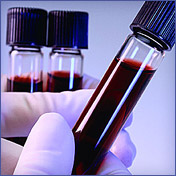Blood Tests

Basic Facts
- Blood tests yield information about many different substances found in blood, such as hormones, minerals, and proteins.
- Drawing blood poses little risk to a person, and test results can be obtained quickly.
- Numerous tests can be conducted using a single blood sample.
Blood tests can yield information about many different substances found in blood, such as hormones, minerals, and proteins. Typically, blood is drawn from a vein using a syringe, a process called venipuncture.
In urology, the most frequently ordered blood tests include:
- Blood urea nitrogen (BUN);
- Creatinine;
- Prostate specific antigen (PSA);
- B-human chorionic gonadotropin (B-hCG);
- Alpha fetoprotein (AFP);
- Uric acid;
- Phosphate; and
- Calcium.
PRE-TEST GUIDELINES
A physician may request the patient avoid certain medications prior to the test.
WHAT TO EXPECT
When blood is drawn, a tourniquet is wrapped around the arm. The patient makes a fist and a sterile, disposable needle is inserted into the vein. A syringe or attached vial is used to collect that blood. After the procedure is complete, a piece of gauze is placed over the insertion point and pressure is applied to stop the bleeding.
POST-TREATMENT GUIDELINES
Patients can resume normal activities following the blood test.
POSSIBLE COMPLICATIONS
The patient may experience temporary bruising at the site of needle insertion.
Copyright © 2017 NorthPoint Domain, Inc. All rights reserved.
This material cannot be reproduced in digital or printed form without the express consent of NorthPoint Domain, Inc. Unauthorized copying or distribution of NorthPoint Domain’s Content is an infringement of the copyright holder’s rights.

